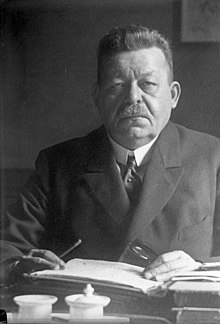Reich presidential election 1919
The presidential election in 1919 by the Weimar National Assembly was the first presidential election of the Weimar Republic and took place on February 11, 1919. The basis for this election was the law on provisional imperial power that had been passed the day before.
The election as Reich President was won by Friedrich Ebert ( SPD ) in the first ballot, supported by the SPD, DDP and the center with 73.1 percent of the vote. Ebert thus became the first Reich President of the Weimar Republic and was able to initiate the formation of a government by appointing Philipp Scheidemann as Reich Minister- President (see Scheidemann cabinet ). In the Weimar Constitution of 1919, the end of the first term of office was dealt with by Article 180, but specifically only by the law amending Article 180 of the Reich Constitution of October 27, 1922: “The Reich President elected by the National Assembly will hold office until the 30th June 1925. “The term of office actually ended with Ebert's death on February 28, 1925.
Result
In addition to Friedrich Ebert, Arthur Graf von Posadowsky-Wehner ( DNVP ), Matthias Erzberger ( center ) and Philipp Scheidemann (SPD) received votes.
The result was as follows:
| 73.1% 277 votes |
12.9% 49 votes |
0.3% 1 vote |
0.3% 1 vote |
13.5% 51 votes |
44 votes |
| Friedrich Ebert |
Arthur Graf von Posadowsky |
Philipp Scheidemann |
Matthias Erzberger |
invalid | not submitted |
| Candidate (party) | supported by | be right | percent | |
|---|---|---|---|---|
| Friedrich Ebert (SPD) | SPD, DDP, center | 277 | 73.1% | |
| Arthur Graf von Posadowsky-Wehner (DNVP) | DNVP | 49 | 12.9% | |
| Philipp Scheidemann (SPD) | - | 1 | 0.3% | |
| Matthias Erzberger (center) | - | 1 | 0.3% | |
| MPs entitled to vote | 423 | 100.0% | ||
| Votes cast | 379 | 89.6% | ||
| Valid votes | 328 | 86.5% | ||
| Invalid votes | 51 | 13.5% | ||
Web links
- Reich presidential elections overall results
Individual evidence
- ↑ The law only contained this one article, it was published in the German Reichsgesetzesblatt 1922, p. 801, original typography at ALEX, Austrian National Library

